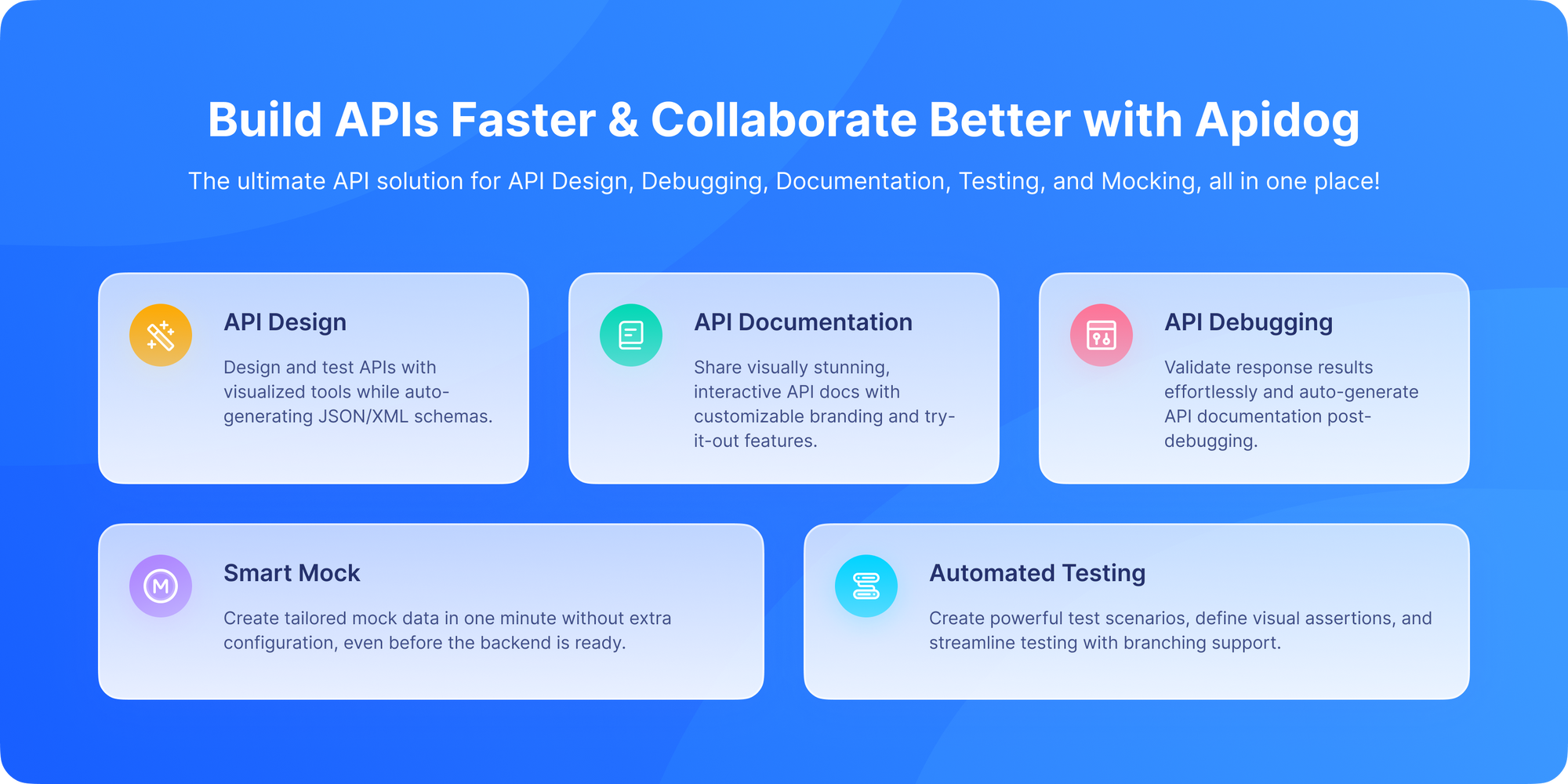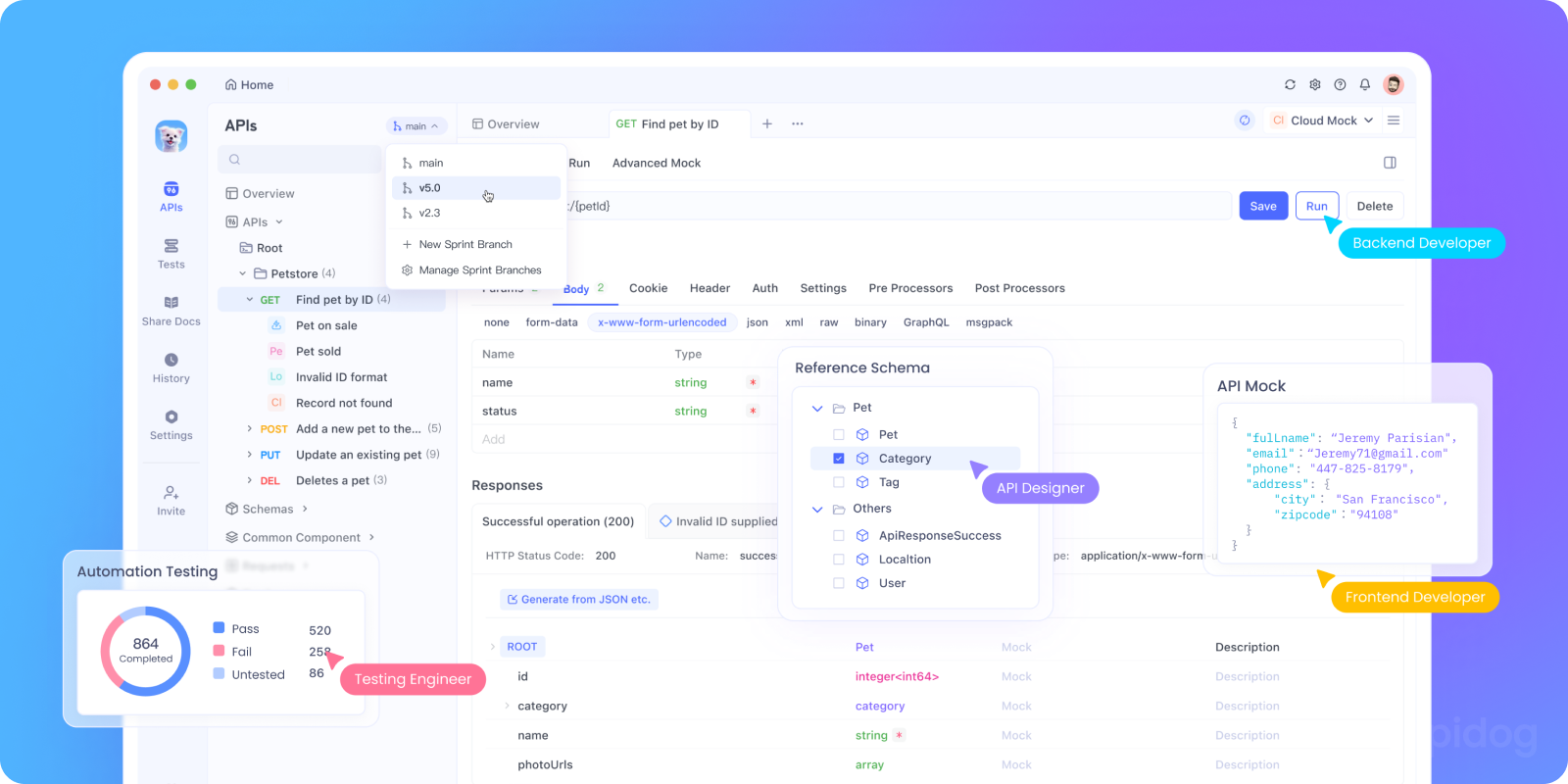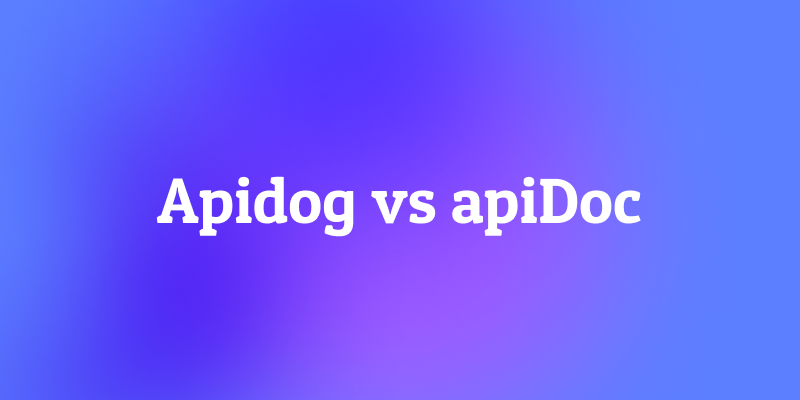You're committed to writing great documentation for your API. You've heard that good docs are crucial for developer adoption and happiness. You start researching tools, and soon you stumble upon two names that look confusingly similar: apiDoc and Apidog.
At first glance, you might think it's a typo. But these are two completely different tools with vastly different philosophies, and choosing the right one will fundamentally shape your API workflow.
Here's the simplest way to understand the difference:
- apiDoc is a specialized, lightweight tool with one primary job: generating API documentation from code comments.
- Apidog is a comprehensive, all-in-one platform that manages the entire API lifecycle design, testing, mocking, and documentation.
It's the difference between a brilliant, single-purpose kitchen gadget (like a garlic press) and a fully stocked, high-tech kitchen that has every tool and appliance you could ever need.
Now, you may be asking yourself: “Should I stick with apiDoc, or is Apidog the better option for my team in 2025?”
That’s exactly what we’ll explore in this blog post. I’ll walk you through what each tool offers, their pros and cons, and which situations they’re best suited for. By the end, you’ll know which one deserves a place in your workflow.
Now, let's clear up the confusion, dive deep into each tool, and help you decide which one is the right fit for your project.
First, The Fundamental Divide: Philosophy and Scope
Before we throw down, let’s make sure we’re comparing apples to apples (or at least apples to futuristic AI-powered apples). The core difference isn't just about features; it's about their entire approach to the API lifecycle.
apiDoc: The Code-First Documentation Specialist
apiDoc is an open-source tool that follows a code-first approach. Its philosophy is: "Write your documentation directly in your source code as comments, and I will generate a static HTML documentation site for you."
It's a single, focused tool in a larger chain. You might use apiDoc for docs, then use Postman for testing, another tool for mocking, and GitHub for collaboration.
Apidog: The Design-First, All-in-One Platform
Apidog is a commercial platform that embraces a design-first and API-first approach. Its philosophy is: "Design your API contract first in a collaborative environment. Then, use my integrated tools to mock, test, debug, and document it all without ever leaving this window."
It aims to be the single, unified workspace for your entire API process, replacing the need for a collection of disparate tools.
Why API Documentation Matters
APIs are the backbone of modern software. From mobile apps to enterprise SaaS products, APIs make systems talk to each other. But here’s the catch: if developers can’t figure out how to use your API, they won’t adopt it.
This is why clear, up-to-date documentation is non-negotiable. Documentation helps developers onboard quickly, reduces support tickets, and creates a smoother developer experience. That’s where tools like apiDoc and Apidog come into play.
A Deep Dive into apiDoc

apiDoc's strength lies in its simplicity and tight integration with the codebase.
How apiDoc Works
Write Comments in Your Code: You use special annotation tags (like @api, @apiName, @apiParam) directly in your source code (e.g., in your Node.js, PHP, or Java files).
javascript
/**
* @api {get} /user/:id Request User information
* @apiName GetUser
* @apiGroup User
*
* @apiParam {Number} id User's unique ID.
*
* @apiSuccess {String} firstname Firstname of the User.
* @apiSuccess {String} lastname Lastname of the User.
*/
app.get('/user/:id', (req, res) => {
// ... your code logic here
});
Run the Command-Line Tool: You run the apidoc command in your terminal.
Generate Static HTML: apiDoc parses all the comments and generates a set of static HTML, CSS, and JavaScript files in an ./apidoc/ output folder.
Host the Docs: You host these static files anywhere (e.g., GitHub Pages, your server, S3 bucket). The result is clean, interactive documentation that allows users to see the endpoints and parameters.
Key Features of apiDoc
- Simple Setup: Easy to install via npm (
npm install apidoc -g). - Code-First: Documentation lives right next to the implementation, which can help keep them in sync.
- Language Agnostic: Works with many languages through comments.
- Customizable: You can create your own templates to change the look and feel.
- Open Source and Free: No cost involved.
Limitations of apiDoc
- Only Documentation: It only does documentation. It doesn't help you test, mock, or design your API.
- Comment Pollution: Complex APIs can lead to huge blocks of comments that can clutter your source code and make it harder to read the actual logic.
- Collaboration Challenges: Since docs are in code comments, the review process is tied to code reviews. Non-developers (like product managers) find it hard to contribute.
- No Mocking or Testing: You need entirely separate tools for these critical workflows.
A Deep Dive into Apidog

Apidog is built for teams that want to professionalize their entire API workflow.
How Apidog Works
- Design Your API: You use Apidog's visual editor to design your API endpoints. You define paths, parameters, responses, and models. This acts as your API contract.
- Collaborate: Share the project with your team. Frontend, backend, and QA engineers can all comment and review the design before any code is written.
- Mock Instantly: Apidog automatically generates a mock server from your design. Frontend developers can immediately start coding against real API endpoints.
- Test and Debug: Use Apidog's powerful testing features to validate your backend implementation as you build it. Write test cases, automate suites, and run them in CI/CD.
- Publish Documentation: Apidog automatically generates beautiful, interactive, always-up-to-date documentation from your design. No separate generation step is needed.
Key Features of Apidog

- All-in-One Platform: Design, mock, test, debug, and document in one place.
- Design-First: Encourages building a stable contract first, which leads to better APIs.
- Powerful Testing: Built-in testing tools with environments, variables, scripts, and automation.
- Instant Mocking: Generates mock APIs instantly from your design.
- Team Collaboration: Real-time collaboration, comments, role-based access, and version history.
- OpenAPI Support: Fully import and export OpenAPI specs, ensuring compatibility.
Considerations for Apidog
- Commercial Product: While it has a generous free plan, advanced features and team usage require a paid subscription.
- Platform Dependency: You are adopting a new platform, which is a larger commitment than installing a simple CLI tool.
- Learning Curve: It has more features to learn compared to apiDoc, though its interface is designed to be intuitive.
Collaboration Because APIs Aren’t Built in a Vacuum
APIs are team sports. So how well do these tools support collaboration?
apiDoc: Solo Player Only
apiDoc is a solo tool.
You generate docs → commit HTML files to Git → maybe host them on GitHub Pages.
That’s it.
No:
- Real-time editing
- Comments or feedback threads
- Role-based permissions
- Activity logs
- Version comparisons (“What changed between v1.2 and v1.3?”)
If your product manager wants to suggest a field rename? They email you. Or Slack you. Or find you in the kitchen.
You manually update code comments → regenerate docs → commit again.
Rinse. Repeat. Cry a little.
Apidog: Real-Time, Role-Based, Comment-Friendly Collaboration
Apidog was built for teams.
You get:
✅ Real-time syncing see your teammate editing an endpoint live
✅ Comment threads on APIs, tests, mocks tag users, resolve threads
✅ Role-based permissions (Viewer, Editor, Admin)
✅ Version history & visual diff comparisons (“Show me what changed”)
✅ Shared environments & variables (dev/staging/prod)
✅ Audit logs (Team plan)
✅ Activity feed see who changed what and when
All of this? Available in the FREE plan. Unlimited team members. Unlimited projects.
Your QA lead can comment on a test case. Your PM can suggest a field rename. Your DevOps engineer can check environment variables all in one place.
No emailing files. No “did you regenerate the docs?” No “which version is this?”
Just… smooth, modern collaboration.
Winner: Apidog (Are You Seeing a Pattern?)
If you work with anyone else, Apidog is the only sane choice. apiDoc is a documentation generator not a collaboration platform.
Side-by-Side Comparison: A Feature Breakdown
| Feature | apiDoc | Apidog |
|---|---|---|
| Primary Purpose | Generate documentation from code comments | Full API lifecycle management |
| Workflow | Code-First | Design-First, API-First |
| Documentation | ✅ (Static HTML from comments) | ✅ (Interactive, auto-generated from design) |
| API Testing | ❌ | ✅ (Full-featured: suites, automation, CI/CD) |
| Mock Server | ❌ | ✅ (Instant, based on API design) |
| API Design Tools | ❌ | ✅ (Visual editor for endpoints & models) |
| Collaboration | ❌ (Via code reviews) | ✅ (Real-time, in-app, with comments & roles) |
| Price | Free (Open Source) | Freemium (Free plan + paid tiers) |
| Learning Curve | Low | Moderate |
Workflow Integration Git, CI/CD, and Automation
How well do these tools fit into your existing DevOps pipeline?
apiDoc: Manual, Script-Heavy, Limited Automation
To use apiDoc in CI/CD:
- Install Node.js + apidoc globally
- Add
apidoccommand to your build script - Output docs to a folder
- Deploy that folder to S3, GitHub Pages, etc.
It works, but it's manual, fragile, and offers no testing or mocking automation.
No:
- Built-in CLI for tests
- Webhooks
- Git sync
- Status checks
You’re responsible for wiring everything together.
Apidog: CLI, Webhooks, Git Sync (Beta), and Growing Fast
Apidog gives you:
✅ CLI tool: run tests, export docs, sync data from command line
✅ Webhooks: trigger actions when APIs change
✅ Import/export: OpenAPI, Postman, Curl, Markdown
✅ Git Sync (beta): link your Apidog project to a Git repo
✅ CI/CD friendly: run test suites in GitHub Actions, Jenkins, etc.
More integrations (GitLab, Azure DevOps, Bitbucket) are coming soon.
It’s not as mature as enterprise tools yet but for most teams, it’s more than enough.
And again it's free.
Winner: Tie (But Apidog Is the Future)
apiDoc wins on simplicity for docs-only pipelines. But Apidog wins on completeness because it handles docs + tests + mocks + automation in one flow.
Pricing Who’s Gonna Raid Your Budget?
Let’s talk money because even free tools have hidden costs (time, complexity, maintenance).
apiDoc: Free (But Costs You Time & Tool Sprawl)
apiDoc is MIT licensed. Free forever. No catches.
But the real cost? All the other tools you need to buy or maintain:
- Postman (for testing) → $12–$39/user/month
- Mockoon (free, but no collaboration)
- Swagger UI (for prettier docs) → more setup
- Slack/email (for collaboration) → chaos
You’re not paying for apiDoc but you’re paying in fragmentation, context-switching, and maintenance overhead.
Apidog: Free Plan Is Actually Free (and Powerful)
Free Plan:
- ✅ Unlimited APIs, projects, team members
- ✅ API design, testing, mocking, docs
- ✅ Cloud sync (limited history)
- ✅ Community support
Team Plan: $19/user/month (annual) or $24/month
- ✅ Advanced permissions, audit logs
- ✅ Priority support
- ✅ More sync history
- ✅ API versioning & diff
Enterprise: Custom (SSO, on-premise, etc.)
You can run an entire startup on Apidog's free tier no feature paywalls, no "pay to collaborate."
Winner: Apidog (By a Mile)
apiDoc is free but forces you to pay elsewhere. Apidog is free and gives you everything you need in one place.
The Decision Matrix: Which One Should You Choose?
The right choice depends entirely on your team's size, needs, and workflow.
Choose apiDoc if:
- You are a small team or solo developer working on a simple project.
- Your only need is basic API documentation.
- You strongly prefer a code-first approach and want docs tightly coupled with your code.
- You have zero budget for tools and need a free, open-source solution.
- You are already using other tools for testing (e.g., Postman) and mocking and are happy with that workflow.
apiDoc is a excellent, focused tool for a single job. It's like a reliable screwdriver it does one thing and does it well.
Choose Apidog if:
- You are a growing team that needs to improve collaboration between frontend, backend, and QA.
- You want to adopt a design-first or API-first methodology.
- You need more than just documentation you want integrated mocking, testing, and debugging.
- You want to speed up development by allowing frontend and backend teams to work in parallel using mocks.
- You are tired of juggling multiple tools (e.g., Swagger UI for docs, Postman for testing, another tool for mocking) and want a unified platform.
- You have a budget for tools that significantly improve productivity and reduce development time.
Apidog is a comprehensive productivity platform. It's like a fully equipped workshop it has every tool you need to build the entire project from start to finish.
Can You Use Them Together?
Technically, yes, but it's not recommended and would create redundancy. You could generate an OpenAPI spec from your Apidog design and use it with apiDoc, but then you'd be maintaining two documentation systems for no benefit. Apidog's built-in documentation is more than capable.
Conclusion: Evolution of API Workflows
The difference between apiDoc and Apidog is a story of evolution.
apiDoc represents an earlier, simpler time in API development. It solved the acute problem of "how do we generate docs easily?" and solved it brilliantly. It remains a perfect fit for projects that align with its specific, focused scope.
Apidog represents the modern, professional approach to API development. It recognizes that documentation isn't an isolated task but a part of a larger lifecycle that includes design, testing, and collaboration. It addresses the chronic problem of "how do we make our entire API process faster, more reliable, and more collaborative?"
For most teams building software today, the fragmentation of using multiple single-purpose tools creates friction, overhead, and confusion. Apidog's value proposition is in eliminating that friction by providing a single, powerful, and integrated home for every aspect of your API work.
If your goal is to just generate docs, apiDoc will serve you well. If your goal is to build better APIs, faster, and with your whole team aligned, then Apidog is the clear choice for the modern developer.



